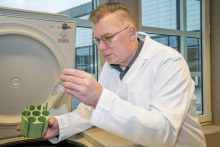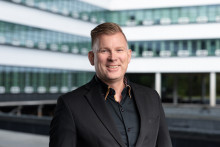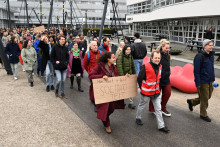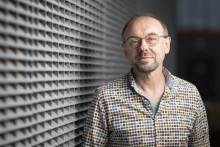His mailbox is heaving with notifications. As of last Monday, Professor Jeroen Cornelissen knows that he has to leave the field. Statements of support and questions come pouring in from all over the country, from fellow researchers who want to know what is going on in Twente. But he also notices a fear that it could affect them too. The prevailing tone: what misery.
He himself is deeply disappointed with the manner of communication. Firstly, the way in which the faculty has been cut seemingly arbitrarily. 'They didn't ask us anything, they didn't even come to us for accountability, or current and upcoming plans. Neither did they offer us any personal perspectives.'
Die is cast
He is not angry. More resigned. 'In a way, it finally offers clarity; the die has been cast. We have known it was coming since December. But the fact that we only finally managed to get 10 February as the final decision date after much insistence, and the lack of any further communication, does not deserve a beauty prize.'
Cold card
The subsequent style of communication and the aftercare were extremely cold. The conversations with the vice-dean and HR were businesslike and short. 'There was little room for emotion or personal stories,' describes Cornelissen, who is rather composed under it all. To illustrate this point, he pulls out a card. Apparently, there was ample opportunity for creating a tightly formatted flyer with a text that reads 'We are here for you' and a QR code that leads to a general HR page. As a small protest, he has stuck it to his office window. 'It could have been more humane. This makes it extra sour.'
Heart and soul into the UT
Cornelissen started at the UT in 2009, with a then new chair in bio-organic and organic chemistry. Until the COVID-19 period, he led innovative research projects and joint publications, which in turn resulted in several prestigious ERC grants. In addition, he was involved in the establishment of the Molecules Centre, intended to strengthen cooperation with companies and research institutions in the region and to focus on sustainable chemistry. This resulted in successful projects and initiatives, such as new bio-based plastics and recycling technologies. 'I have put my heart and soul into the UT for 16 years,' Cornelissen sums up his career.
He had a lot of great plans. 'Not only for the UT, but the entire Twente region. For example, we can use biochemical processes to come up with new textile solutions that benefit the entire region, also from a cultural-historical point of view. We were brainstorming enthusiastically under the working title 'Bringing textile home to Twente', given local history and an impulse for employment. That will have to be put on hold now.'
'If you don't know where you want to go, you can't make good choices'
To Cornelissen, the reorganisation seems to be carried out arbitrarily and ad hoc, without an eye to the future. He blames it on a lack of vision on the part of the faculty board, and refers to the previously submitted piece by his colleague Jurriaan Huskens. 'If you don't know where you want to go, you can't make well-founded choices when it comes to these kinds of things.'
Who will take over the responsibilities for education and research projects after the reorganisation? Cornelissen stretches out his hands helplessly.
Essential knowledge lost
He expresses his concerns about the loss of expertise and infrastructure, such as essential knowledge of nuclear magnetic resonance (NMR), a device used to determine the molecular composition of substances. 'It's like deciding at a masonry course not to use a spirit level anymore.'
Cornelissen also thinks that the imminent lack of experienced staff will cause the quality of education and the supervision of ongoing research to plummet, which will create uncertainty among the students who are lagging behind, and make the UT a less interesting location for new enrolments. 'In addition, the remaining staff will have an extra burden on their plate.'
Another point that Cornelissen cannot understand is how the plans have been drawn up without regard to gender diversity. 'A relatively large number of female colleagues have been laid off. So our gender diversity is also tilting in the wrong direction again.'
New career step
What will he do himself? He doesn't know yet, but is considering taking a new step in his career, in a board position or as a manager. 'Others indicated that they could envision me as dean for this faculty. But we already have two at the moment, with Wiendelt Steenbergen filling in for Jennifer Herek. A third would be a bit too much of a good thing.'
On Monday, the victims will meet for a cup of coffee and to seek support. He himself is working on an email: 'I am actually exempted from work. But tomorrow a lecture hall full of students will be waiting.'






